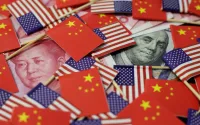17 June 2008
Saudi Arabia appears ready to cave in to demands from Western governments for the kingdom to make special efforts to increase its production of oil. Analysts forecast that the world's largest producer will shortly raise its output by half a million barrels a day. The United Nations Secretary-General, Ban Ki-Moon, confirmed this impression at the weekend after emerging from talks with the Saudi monarch, King Abdullah.
But there are also indications that the Saudis will make their own counter-demands when oil producers and consumers meet at an emergency energy summit next weekend. One such requirement might be for Western governments to play their part in adapting to the higher prices by relaxing their domestic taxes on fuel. This represents a considerable shift from Saudi Arabia. Up until now, the country's rulers have blamed the soaring oil price on speculation in Western financial markets – a phenomenon driven, they say, by a false perception of a shortage of global capacity. There is little doubt that speculation is playing some part in pushing up the price of oil to an unprecedented $140 a barrel. Yet the fact that inventories have been at normal levels suggests this is not the driving force behind price rises.
Growing demand is the far more likely culprit. It is often asserted that Saudis still have vast oil reserves. But there is no independently verified proof of this. We have no choice but to rely on what they choose to tell us. If the kingdom really thinks the present price is the result of a speculative bubble driven by misinformation about its reserves, it ought to open up its oilfields to independent inspection to dispel the doubts. Of course it will not do this. But, for now at least, it looks ready to increase production.
An increase in Saudi oil pumping might well have the desired effect of bringing down the price somewhat. But what if it does not fall low enough to ease the pain of the world economy? How long before our political leaders return to Saudi and its Opec allies to plead for more? And what will be the political price extracted for this? What we are seeing in this desperate horse-trading is the endgame of the oil age. Even if we have not yet reached the inevitable moment of "peak oil", when production begins its inexorable decline, it is abundantly clear that the age of cheap fuel is over. The economic leaps forward by China and India represent a step-change in energy demand. The rate of discovery of new oilfields has failed to keep pace with the speed at which nations are joining the global economy. That means the price of oil will remain considerably above the level to which we have historically been accustomed.
That is the central fact that governments ought to be addressing. It is ridiculous for the Saudis to attempt to tell Western governments how they ought to tax fuel sales, just as it is ridiculous for Western governments to tell Saudi Arabia and other oil producers how much they ought to pump out of the ground. The debate ought to be about how best to break our economic dependence on oil.
Governments should recognise the pain being endured by drivers and businesses at the petrol pumps. But their response should not be to tell their electorates that hectoring the Saudis will bring down the price of fuel, or to mess around with short-term gestures such as suspending taxation. Instead, it should be to announce that funds from higher fuel taxes will be channelled into alternative, clean power generation and energy conservation schemes. The fact that so many of our political leaders are pinning their hopes on the oil producers riding to the rescue merely confirms how tenuously they grasp the new reality.






